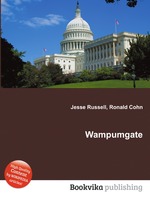Wampumgate
Jesse Russell Ronald Cohn
бумажная книга
High Quality Content by WIKIPEDIA articles! Wampumgate is the name for the controversy around the July 14, 1995 rejection of an Indian gambling project by three impoverished Chippewa Indian tribes who hoped to establish a casino in Hudson, Wisconsin, located just outside the Twin Cities of Minneapolis/St. Paul. Documents uncovered by Congressional investigators, lawsuits and an Independent Counsel showed evidence that political contributions and pressure from lobbyists from rival tribes caused Bruce Babbitt to overrule staff recommendations and deny the casino application. The opposing tribes included the Ho-Chunk, Mdewankaton Sioux and six other tribes, mostly from neighboring Minnesota, who felt the Hudson casino would interfere with their own highly lucrative gambling operations. When Babbitt gave conflicting explanations of the incident to Congressional leaders, Atty Gen Janet Reno, who had resisted an independent probe of campaign finance, asked a judicial panel to appoint an outside prosecutor to probe Bruce Babbitt`s role in the rejection as well as the influence of campaign contributions. The Chippewas engaged Phoenix attorney and longtime Babbitt confidant Paul Eckstein to act as an informal liaison with Babbitt. Eckstein later became incensed when Babbitt hinted to him at a private meeting that the decision to turn down the tribes was influenced by campaign contributions from the opponents. Janet Reno denied the independent counsel right to probe broader campaign fund-raising issues in the Clinton administration. President Clinton supported Bruce Babbitt in his overruling regional Interior officials. Records from the Interior Department showed that the office of Harold Ickes, then Pres Clinton`s Deputy Chief of Staff, did in fact contact Babbitt`s aides about the Hudson project. In addition, Donald Fowler, chairman of the Democratic National Committee, made phone calls to senior Interior Department staff on behalf of the opposition and there were numerous contacts between Interior staff and lobbyists and officials from the opposing tribes. One prominent lobbyist, Patrick O`Connor, spoke directly with President Clinton in Minneapolis about the matter, triggering calls to the White House from Air Force One by Bruce Lindsey. O`Connor later contacted Ickes directly regarding Hudson.


